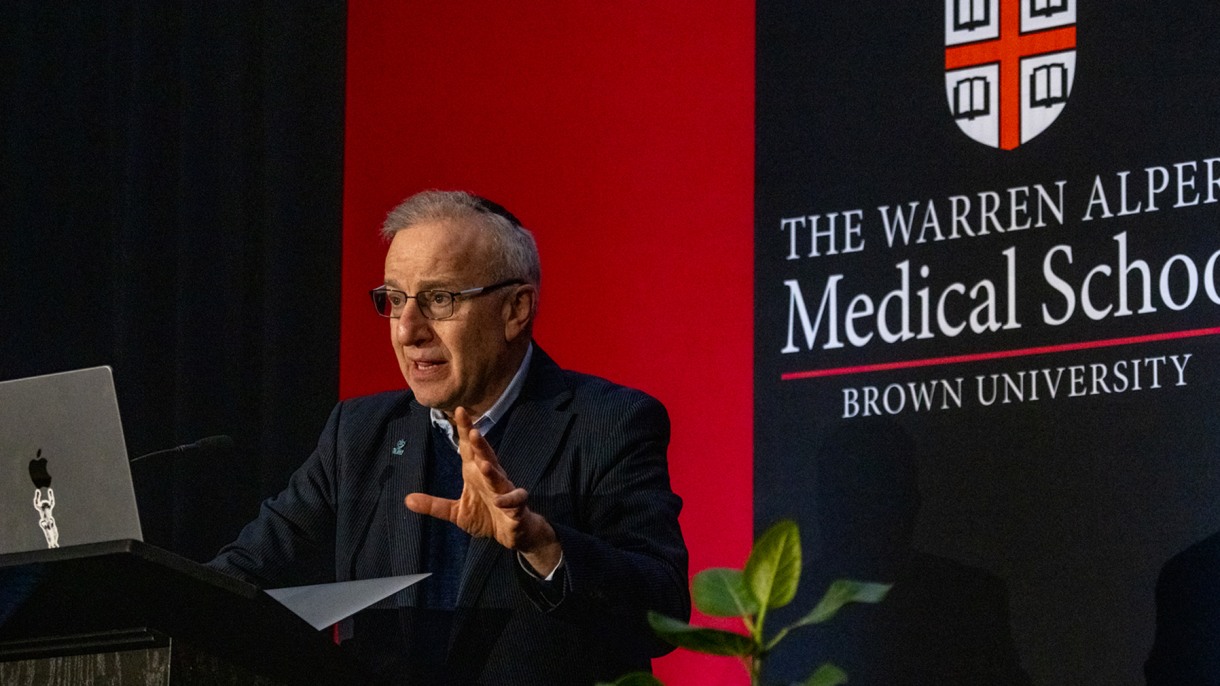In a presentation at Brown’s Warren Alpert Medical School, Dr. Isaac Kohane, who has worked on medical AI since the 1990s, urged doctors-in-training to understand and make use of artificial intelligence.
In this year’s Levinger lecture hosted by the Warren Alpert Medical School, Dr. Isaac Kohane urged medical students and educators to take AI seriously. Photo by David DelPoio.
PROVIDENCE, R.I. [Brown University] — “If you’re not using it, you’re like those kids who are coming out of college in 1990 and still they’re not learning how to use word processors.”
That was the advice that Dr. Isaac Kohane, a bioinformatics expert and pediatric endocrinologist who has worked on artificial intelligence applications in medicine since the 1990s, shared with Brown University medical students and educators in an event on Wednesday, Jan. 24.
Kohane was talking about generative AI — machine learning algorithms that respond to input with uncannily human-like text. He had been invited to Brown’s Warren Alpert Medical School by the AI in Medicine student group to present as part of the annual Paul Levinger lecture series, which features leaders whose work focuses on the economics of health care.
Speaking to an auditorium packed with medical students, educators, scientists and members of the public, Kohane aimed to convince the crowd that generative AI should be an urgent reminder that medicine, at its core, is a knowledge-processing discipline.
Kohane, who studied biology and computer science as an undergraduate at Brown, was not one of those Luddite college grads: He was, in fact, a prescient early adopter. He earned a Ph.D. in computer science in the 1980s and integrated computer science and informatics research into his clinical work at Boston Children’s Hospital, developing and applying computational techniques to address disease at multiple scales. He is the founder and chair of Harvard Medical School’s Department of Biomedical Informatics, editor-in-chief of the journal NEJM AI and a co-author of “The AI Revolution in Medicine.” Marketing copy for that book described him as “urgently focused on helping doctors become more effective and fulfilled as they work with machine intelligence.”
Kohane came to Brown, he told the medical students, to “stir them up” about AI: “It’s an existential opportunity and threat to medicine to not take this seriously,” he said.
First, the opportunities. Kohane said that when he was completing his Ph.D. in computer science during an earlier heyday of AI in medicine, many of the claims about AI’s potential and power were “false hype.” But reality has since caught up with the hype.
Kohane, whose current clinical focus is undiagnosed diseases, shared a story about a healthy-seeming child who mysteriously started having trouble walking and talking. The child was seen by specialists in multiple health systems, none of whom were able to figure out what was wrong. Finally, Kohane and other medical experts were able to use AI, in combination with whole genome sequence and clinical histories, to diagnose and then treat the condition. Within weeks, the child was walking and talking normally again.
“This thing that’s basically electrical language supremacist can actually do basic rare disease diagnoses at a very, very high level,” Kohane said.
“Every time you see a patient, you’re processing all those different sources of knowledge,” he told the doctors-in-training. “The data that you’re getting from the patient, the data that you’re getting from the record, the data that you remember getting from previous patients during clinical experience, [the data] from keeping up with the medical literature… and if you went to great medical school like Brown, you’re also learning great clinical medicine. So any of those things that do not work efficiently are going to cripple and decrease your ability to do optimal decision-making for your patients.”
Yet Kohane believes that physicians are at a disadvantage: Unlike machine-learning tools, they aren’t being fed reams of data and information. They don’t have access, for example, to electronic health records that would help them review and interpret every detail of a patient’s medical history and lifetime health care. The don’t have the same resources.
“When I go to Netflix, it knows based on what I’ve seen, what I’m going to ask to see next or what I might be interested to see next,” Kohane pointed out. “We cannot do that in medicine. Why? Because unlike Netflix, we don’t have all the data. We [in medicine] don’t share the data.”
Corporations and other entities do share personal data, of course, but not for clinical care or medical research that isn’t highly profitable, Kohane said. That means that people who don’t understand medicine are interpreting patient data in ways that he said are “incautious or silly.”
“There are many ways that clinical research and basic research is going to be accelerated by AI,” Kohane said. “I’m telling you that Microsoft and Google and others are doing their best to buy up that resource. And most of us in health care, because we don’t have either the staff or the strategy or the know-how, we don’t have in our health care system that kind of vision.”
Kohane urged physicians and physicians-to-be to learn how to program, to code, to use AI, and to think about how to best use computing “from both the dark side — the dollar-driven side” as well as for use in genomics and clinical decision-making.
“If we do not understand [AI], the corporatization of medicine that has already hurt us so much will be accelerated far more,” he stressed.
At the very least, Kohane said, medical students as well as educators should start using generative AI such as ChatGPT: “Ask questions. Use them all the time in different ways. See what they can do.”
Like the word processors of the previous generations, Kohane said, “this thought processor is something that can accelerate you.”
